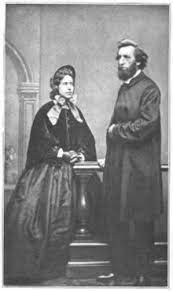 |
| Courtesy Salvation Army |
One site indicated that she was said to have read the Bible through eight times before she was twelve years old. Her strict parents forbid her playing with other children, reading fiction, or learning French. Another source indicated Catherine gave up eating sugar after discovering its link to African slavery.
She suffered from ill health during most of her childhood. At fourteen, she was confined to bed with an undiagnosed ailment, so she used her time to read various theology books, beginning with The Pilgrim’s Progress that would later inform her beliefs to reject Calvinistic teaching that only certain people are predestined to be saved. She also became concerned about the problems of alcoholism and joined the Juvenile Temperance Society where she served as secretary.
When she was twenty-one, she was expelled from the Wesleyan Methodist organization for refusing to condemn Methodist Reformers. The following year she met William Booth who had also been expelled because of his reform sympathies. It is said she fell in love with him while seeing him recite a temperance poem.
The couple was engaged for three years while William worked as a circuit preacher. Their wedding
 |
| WikiImages |
In 1865, the Booths started The Christian Mission in London’s East end. William preached to the poor, and Catherine spoke to the wealthy to gain financial support for the ministry. She also organized Food for the Million shops where cheap meals were available. At Christmastime, meals were distributed to those in need. Working with children and young people, she often spoke at their meetings.
Catherine had always been convinced of women’s equality to men with regard to preaching, and after she discovered American revivalist Phoebe Palmer, she asked William if she could “say a word” during one of his services. Apparently, she was so eloquent that women insisted he become a partner in his work which angered many people who disagreed. Leaders in the Church of England were hostile to the Booths, publicly criticizing them. Undeterred, she would go on to preach at revival services and other events. She often spoke to people in their homes, especially those who struggled with alcoholism.
Distraught over the number of young girls involved in prostitution, she lobbied Queen Victoria to create legislation safeguarding females. After learning that many of women working in match factories were suffering illnesses such as “Phossy Jaw,” Catherine lobbied to manufacturers to use red phosphorous for match heads instead of the poisonous yellow phosphorous.
When The Christian Mission became The Salvation Army, the group adopted uniforms to bolster morale as well as make them recognizable to one another on the streets. One site claims the name developed from an incident during which Bramwell Booth overheard his father comment, “We are a volunteer army.” Bramwell responded that “I’m no volunteer, I’m a regular,” at which point the word volunteer was replaced with the word salvation.
Catherine continued to preach and work by her husband’s side, pioneering leadership positions for women in the church. She did not try to change women’s domestic roles, but vocally opposed the concept of their alleged intellectual and moral inferiority. Diagnosed with breast cancer in 1888, she refused surgery so that she could continue her work. She died on October 4, 1890. Her funeral in London was attended by 38,000 people.
_________________________
Linda Shenton Matchett writes about ordinary people who did extraordinary things in days gone by. A native of Baltimore, Maryland, she was born a stone’s throw from Fort McHenry (of Star-Spangled Banner fame) and has lived in historical places all her life. She is a volunteer docent and archivist at the Wright Museum of WWII and a former trustee for her local public library. She now lives in central New Hampshire where she explores the history of this great state and immerses herself in the imaginary worlds created by other authors.
Beryl’s Bounty Hunter
Can a thief and a lawman find happiness?
Orphaned as a child, Beryl Atherton has lived on the streets of London as long as she can remember. Reduced to stealing for survival, she is arrested. During her incarceration one of her cellmates shows her a newspaper ad for an American mail-order bride agency. But all is not as it seems, and moments after landing in Boston, she must run for her life. Will things be no different for her in the New World?
Working as a bounty hunter since The War Between the States, Lucas Wolf just needs a few more cases before he can hang up his gun, purchase a ranch out West, and apply for a mail-order bride from the Westward Home & Hearts Mail-Order Bride Agency. While staking out the docks in Boston, he sees a woman fleeing from the man he’s been tailing. Saving her risks his job. Not saving her risks his heart.
Beryl’s Bounty Hunter
Can a thief and a lawman find happiness?
Orphaned as a child, Beryl Atherton has lived on the streets of London as long as she can remember. Reduced to stealing for survival, she is arrested. During her incarceration one of her cellmates shows her a newspaper ad for an American mail-order bride agency. But all is not as it seems, and moments after landing in Boston, she must run for her life. Will things be no different for her in the New World?
Working as a bounty hunter since The War Between the States, Lucas Wolf just needs a few more cases before he can hang up his gun, purchase a ranch out West, and apply for a mail-order bride from the Westward Home & Hearts Mail-Order Bride Agency. While staking out the docks in Boston, he sees a woman fleeing from the man he’s been tailing. Saving her risks his job. Not saving her risks his heart.
Purchase Link: https://amzn.to/3K2QhWo




Thank you for posting today and telling us about this amazing woman!
ReplyDelete